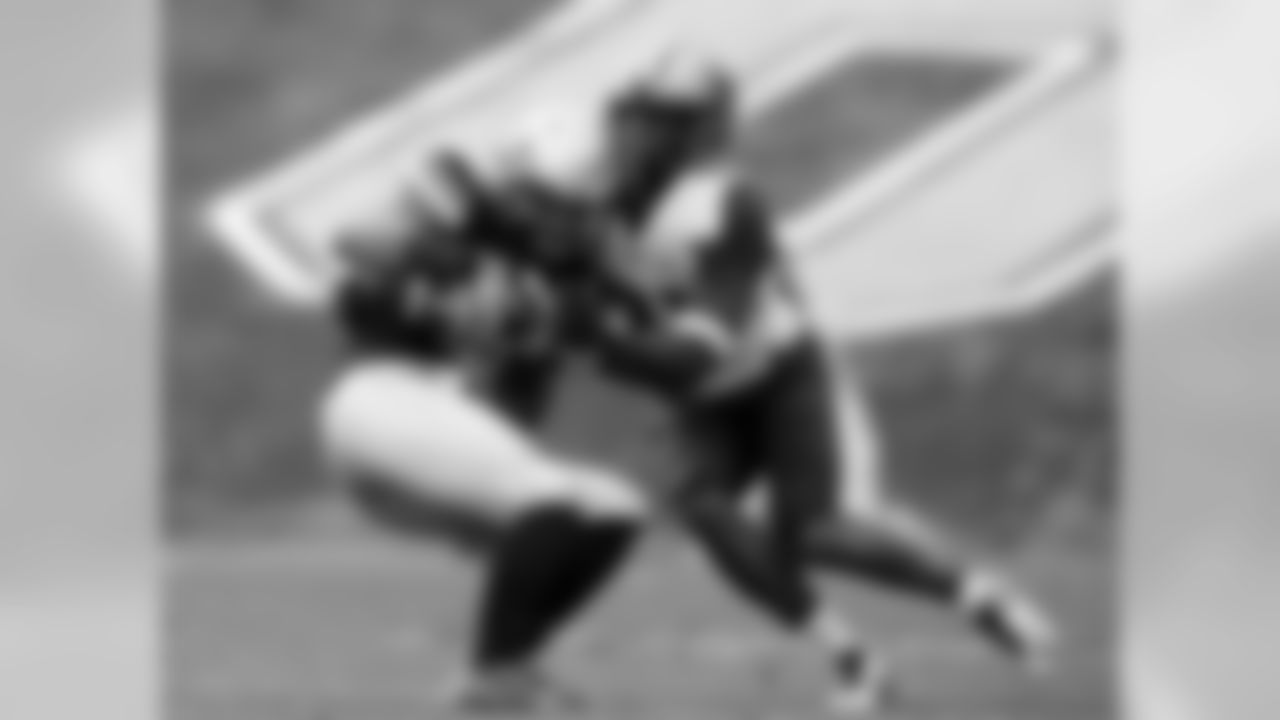When the Kansas City Chiefs selected former University of Washington cornerback Marcus Peters with the No. 18 pick in the first round of the 2015 NFL Draft, there were going to be questions.
That's just the nature of the game when you select a player who didn't finish his collegiate season due to being dismissed from the team, which was the case with Peters.
But as general manager John Dorsey, head coach Andy Reid and director of player personnel Chris Ballard explain, there wasn't a lack of due diligence on the Chiefs' behalf to try and understand not only about Peters the player, but also, more importantly, Peters the man.
On the field, Peters doesn't have many question marks.
At 6-foot tall and 197 pounds, Peters has the prototypical size for an NFL cornerback.
More importantly, Peters excels in press coverage and getting physical with receivers off the line of scrimmage—something that will undoubtedly serve him well under defensive coordinator Bob Sutton's scheme in Kansas City.
Over his past two seasons, Peters allowed a completion percentage of just 38.1 percent, which included 24 passes defensed and eight interceptions.
For comparisons' sake, the Seattle Seahawks' Richard Sherman (47.7 percent), the Denver Broncos' Chris Harris (51.7 percent) and New York Jets' Darrelle Revis (51.9 percent) couldn't come close to those numbers.
Peters' numbers are from college and these other guys are going up against professionals. That's an obvious difference. But the questions surrounding Peters have very little to do with what he's able to do on the field, which even by these college numbers, show the kind of dominance he displayed during his time playing in the Pac 12.

More than 20 people were involved in the vetting process of Peters, which included speaking with both coaching staffs that he played for at Washington—led by former head coach Steve Sarkisian, who was with Peters for three years (2011-13) before he took the USC job this past season, then the new coach, Chris Peterson, who had just come over from Boise State.
This process also included a special trip by Ballard to West Oakland earlier in the week to visit Peters' family in his hometown, not to mention an initial meeting at the NFL Scouting Combine back in February and a then a visit earlier in this process by Peters to the Chiefs facilities.
The Chiefs were going to leave no stone unturned when it came to getting down to what happened at Washington and that which led Peters to being dismissed from the team.
For Peters, the trip to Kansas City and the opportunity to meet with the Chiefs coaching staff early in this process resonated with him when he received that call on Thursday night.
"I just had one of those great feelings when they called," he said. "It felt like home walking into that building.
"They have a wonderful system there and I'm just blessed to be a part of the Kansas City Chiefs."

Long before he was a first-round pick, Peters was a standout playmaker for the McClymonds High School Warriors (CA) football team, who just happened to be coached by Peters' father, Michael, a longtime assistant at the West Oakland high school before he took over as head coach.
His father was a disciplinarian, which was necessary for Marcus growing up in the tough neighborhood of West Oakland.
While his father was a football coach, his mother worked as a preschool teacher at the local YMCA, a position she still has to this day.
Both of his parents are engrained into the West Oakland community. They've had five generations of Peters roll through McClymonds High School.
"He's got good parents, good people, good hard-working people who care, who care about the Oakland community, who care about kids," Ballard said. "They've both done a lot for that community."
Peters grew up in that community and was always surrounded by football.
With the 18th pick in the first round of the 2015 NFL Draft the Chiefs select DB Marcus Peters













When speaking on a conference call with local Kansas City media after he was drafted on Thursday night, Peters seemed to acknowledge where he was headed while sitting in the very place that shaped everything that made him who he is today.
"I'm sitting here on my grandmother's stairs and I'm looking right at my high school football field," he said. "I've been looking at my high school football field since I was a baby. My first steps were on a football field and it's been dear to my heart ever since.
"For me to be able to grow up in this family and with football being so much of a building block in the foundation stages for me, it's huge."
Football was a release for Peters, who made his way to the University of Washington after helping the Warriors post a 12-0 record his senior season.
While playing for the Sarkisian-led Huskies, Peters blossomed into a star, earning the No. 1 cornerback designation as a sophomore in 2013 after Desmond Trufant, the former No. 1 guy, became a first-round draft pick by the Atlanta Falcons.
After Sarkisian left, Peterson took over as head coach—coming over from Boise State, which is ultimately where things took a turn.
"He might have been caught up in the culture of the old regime that recruited him into a new regime," Dorsey said. "Sometimes it doesn't always mesh properly."
Peters admitted he didn't handle the change very well with the new staff. He clashed with coaches and ultimately was dismissed from the team.
"I had a coaching change up there at the [University of Washington] that caused me to act out of character," Peters said. "I didn't handle the coaching change very well and I take sole responsibility on that because it was on me to make that situation better for me and my teammates.
"I lived and I learned from it. If you have that taken away from you, you've got to make some changes."
The Chiefs did their due diligence in finding out about Peters, which meant Reid reached out to a couple of professional acquaintances that he happened to have a relationship with.
"(Chris Peterson) does a phenomenal job and I have a ton of respect for him and he's a straight shooter," Reid said. "I also know (former Washington head coach Steve) Sarkisian and I have a lot of respect for him as well, so we talked to them."
The information gathered by Reid from Peters' two former coaches, plus the work done by Ballard in visiting his family and hometown, plus the other interviews, gave the Chiefs enough information to pull the trigger on Peters at No. 18.
"My whole mindset going into the draft was that whoever landed me, they would give me an opportunity to showcase that my character is not what I put on display at my last year at the University of Washington," Peters explained.
In the beginning of this process, Ballard said it was an area scout who was the first to bring Peters' name to the table.
"We had a scout, Trey Koziol, a West Coast scout who really stood on the table and kept banging, saying 'Look, Peters is a good kid who made a mistake. He lost control and he's remorseful for it.'
"At the end of the day, through Trey's work, through when we brought him here on the visit, we had other scouts go to dinner and spend a lot of time with him, and for me, going out to Oakland, spending time with his family, we felt comfortable that we were getting a good kid, a good player and a good teammate."
Ballard flew out to Oakland on Monday, then spent most of Tuesday with Peters and his family. He said he spent about an hour and a half talking with Marcus before meeting up with his mother at a restaurant, then heading over to the high school to visit with his father.
"I went out there and it wasn't a recruiting trip," Ballard said. "This was an honesty trip with me being directly honest with Marcus about what happened and also very honest with his parents about what happened.
"Nobody made excuses—not mom, not dad, not Marcus. They all know that he made a mistake and he was wrong in the situation."
Dorsey said Ballard's trip was important.
"We had a lot of questions answered there," Dorsey said. "I think it's important to understand a person's surroundings, his environment, his family, what his makeup is and to meet his parents.
"I think his dad is a straight shooter; he's no-nonsense. He made no excuses for him with what took place at Washington. He was very honest with his son that he should have handled it in a different way."

One thing Dorsey has always preached is football character and finding out what makes a player tick, so the decision to select Peters was made with those traits in mind.
"If I didn't think he would fit in the culture or the environment of this community or the organization, he wouldn't be here," Dorsey said.
Two reasons the Chiefs can feel good about how Peters will engrain himself with this football team are the two guys he'll be working closely with on a daily basis, defensive backs coach and Pro Football Hall of Famer Emmitt Thomas and assistant secondary coach and former All-Pro cornerback, Al Harris.
It's hard to think of a better situation for a young cornerback to find himself in than what Peters has waiting for him in Kansas City.
"Al (Harris) spent quite a bit of time with him, as did Emmitt (Thomas) when he was here and at the Combine," Reid said. "I think he and [Harris] are wired similarly.
"I had [Harris] when he was young and wanted to get up and get after you. He was relentless with that. I think Peters really respects Al is what I think.
"And Emmitt – how can you not respect Emmitt? Emmitt has a way about him with players, it's pretty amazing."
Ballard agreed.
"He's got a great teacher in Al Harris," Ballard said. "I think (Harris) will be not only a coach, but also a mentor for him."
Peters seemed excited about the opportunity to learn from these two great coaches.
"They're here to help me grow," Peters said. "To be able to sit down and be coached by one of the greats that I watched play ball, Al Harris, have him as one of my coaches and embrace him as a mentor, it's going to be crazy.
"He's going to help me grow into a player that I need to be."
Throughout the pre-draft process, Reid said Dorsey made sure he saw plenty of tape on Peters.
"Dorsey locked me into that room, so I saw it all," Reid said. "But you pick a game and you can get a good idea of how he plays."
Dorsey shared what jumped out on tape to him.
"I think that he has probably got the best ball skills of any* *defensive back in this draft," he said. "I think he is incredibly physical in run support. I think he's got an incredible feel for the game of football.
"As one very famous defensive coordinator told me, he's the best defensive back in the last four years," Dorsey said. "He just sent me that text."
He continued.
"He can be very physical in press (coverage)," Dorsey said. "He can instinctively turn and mirror routes with receivers. On run support, nice strong run support, sheds the receiver's blocks. He's a square tackler. I just like the way he plays the game of football."
Peters joins a Chiefs defense that despite finishing second in the NFL last season by giving up an average of just 17.6 points per game, intercepted just six passes, which tied them for last in the NFL in that category.
"We're excited about adding him into an already explosive defense at a very important position – that cornerback position," Reid said. "Not only is it an important position from a defensive standpoint, but we also don't have a lot of numbers there."
This wouldn't be the first time that Reid has been in the position of working with a young player that may have fallen in the draft due to perceived character concerns.
"I've had a little bit of success with that," Reid said. "DeSean Jackson fell in the draft and turned out to be pretty good. Over my time, I've had a few of those. But everybody is different; everybody has their own little thing.
"He's not a problem off the field, that's not what he is. He's not a problem in your locker room, that's not what he is.
"He's smart. It's just those competitive juices—you have to know how to control those."
Peters admitted that he plays the game with a passion that's fueled by that competitiveness.
"That's embedded in me," Peters said. "That's been embedded in me since I was a youth and that's just how I was raised to play this game. You're out there playing against another man who is basically now trying to take your place and trying to make your team lose a game.
"I'm not having that. I am going to do whatever it takes to protect my island and protect my team."













